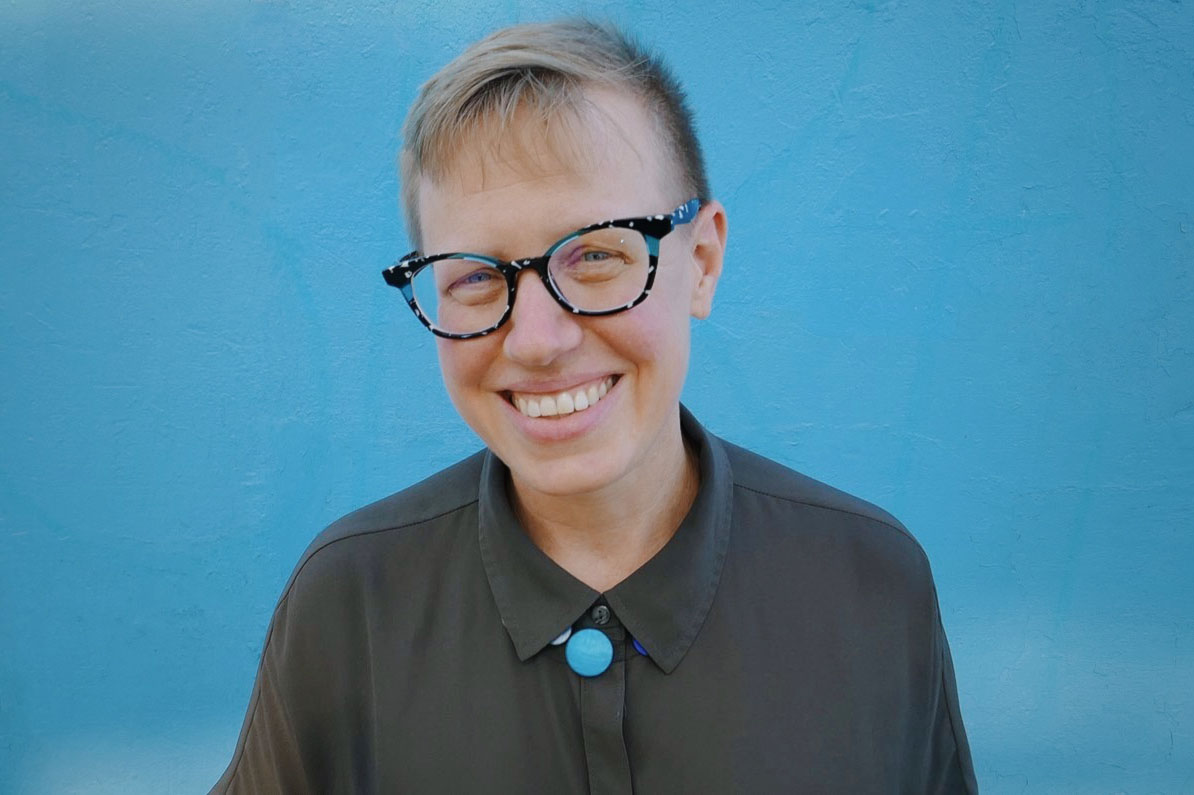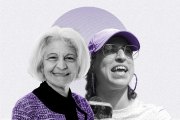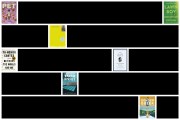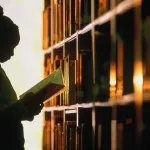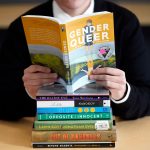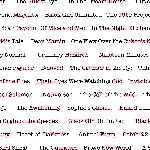Last weekend, outgoing American Library Association President Emily Drabinski arrived in San Diego for the organization’s annual meeting after a 4,951-mile, cross-country road trip with stops at libraries in Rhode Island, West Virginia, Missouri, Kansas, New Mexico and Arizona.
In Man, West Virginia, population 772, Drabinski met with a longtime librarian who maintains a collection documenting the history of the rural area, including a coal slurry dam burst in 1972 that caused devastating flooding, killing 125 and ruining the homes of thousands. In Rossville, Kansas, population about 1,000, she learned that its local library is known for having the fastest Wi-Fi in the area and a book club that has met monthly for 17 years. She was joined by Leah Richardson, a librarian with the George Washington University’s Special Collections Research Center, as well as Nikita K. Carpenter Jr., a filmmaker who documented their journey.
Drabinski, an academic librarian, spoke to The 19th ahead of the conclusion of her year-long term at the head of the American Library Association (ALA). She said meeting the librarians was the highlight of her tenure. The lowlight, though, was watching the “weaponization of libraries in an ongoing fight against the public good and against democracy.”
This interview has been edited for length and clarity.
Amanda Becker: The American Library Association is tracking more than 100 state-level bills introduced this legislative session alone that could adversely affect libraries and librarians — proposed censorship, book banning, criminalizing the provision of LGBTQ+ materials. What do you think these bills are trying to accomplish?
Emily Drabinski: I think we have to look at what libraries do to understand why they are subject to these kinds of attacks. I visited a library in Page, Arizona, that provides meals for people in the area. We saw a library in Kansas where the librarian collects stuffed animals — she just loves them and has them in the library. The area is economically depressed — I think 80 percent of the kids qualify for free and reduced lunch. She was telling me about a child who wanted to leave her stuffed animal there overnight because she knew her animal would be safe in the library.
I think it’s an assault on that: the care that I think most of us want to give to one another. The library is one of the last spaces that I think we all agree is good, and so ripping that apart turns us against each other.
I think it’s also, fundamentally, part of an attack on democracy. If we believe that in a democratic society, you need people to be able to understand what’s happening in their worlds so that they can make decisions about the kind of government that they want, and the kinds of responses to those public problems they want, a good way to make sure that you don’t have anybody asking for anything is to make sure they don’t know what they’re doing, that they don’t know what’s happening.
-
Read Next:
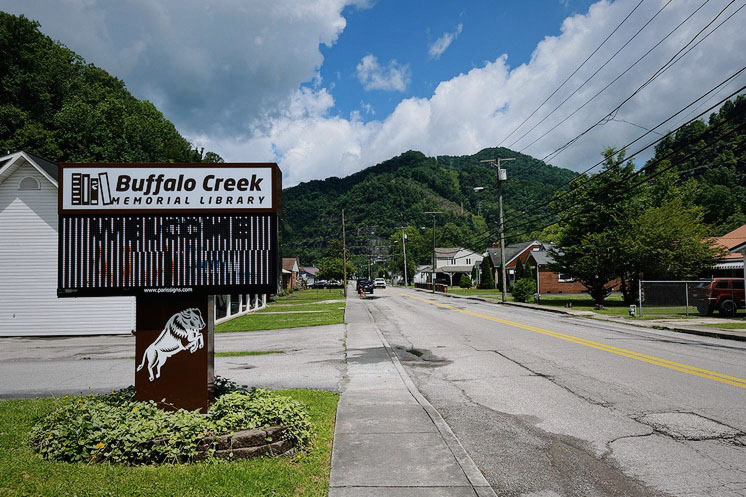
Tell me more about your road trip. I know this is something ALA presidents often do, but you are a queer woman heading the ALA at a time when LGBTQ+ material, in particular, is the target of many censorship attempts from the right. How did you feel heading into the trip? How do you feel after?
We have heard a relentless drumbeat of narrative about libraries from people who oppose them. So I thought: Let’s tell an affirmative story about what libraries are actually doing. Because I believe if people knew the contributions that libraries are making in their communities, they’d be all-in on the library. And if you solve the problem for the library, you solve a lot of the problems in the world, right?
I’m obviously queer. You can tell just by looking at me. Our filmmaker is African American, and we talked about that. We talked about “Are we going to be safe on the road in this country?”
I feel like I have a lot in common with a lot of librarians across the country right now — a lot of us have been subjected to these kinds of attacks. It’s personally painful to be weaponized in that way against the people and institutions I care most about. But, you know, it’s not about me. It’s about the impact on communities. Communities that are seeing one of the best institutions they have dismantled for what seemed to me to be purely bigoted reasons.
I think there’s a lot more fear out on the Internet about that than there is in real life. We went to communities where I would imagine that there are people who disagree with homosexuality. We visited deep red parts of the country. Everywhere we went, we were welcomed. Everywhere. Everywhere I went, people wanted to tell me about their experiences. People want to be seen. They want to be heard. They want to be engaged. They want to believe that the work they do matters. And I think that’s what people really want, much more than they want to demonize a gay person.
-
Read Next:
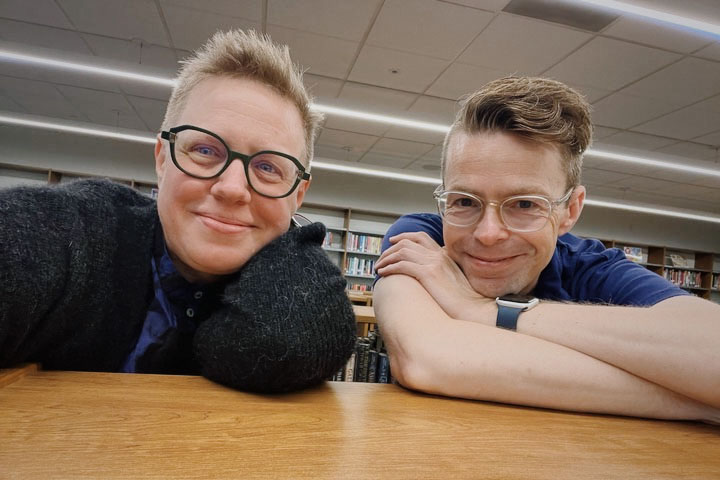
When we spoke a few months back, you relayed an anecdote from a librarian who I think was in New Mexico. A patron had brought in a list of books they wanted taken off the shelves — turns out, the library didn’t have many of them to begin with. After talking, the librarian realized what the patron wanted most of all was the addition of books that reflected their priorities and viewpoints. A both/and, not an either/or. Is this the type of responsiveness you’re talking about?
We want to meet the needs of everyone in our communities. And we do that by engaging with our community. We show up at community events, we table, we do surveys, we do focus groups, we read studies. We try to figure out who’s in our community and how we can serve them better.
I was in a library in Lebanon, New Hampshire. They circulate garden beds, you can check out a garden bed for the growing season. The librarian was telling me about that and then said, “Next we need to get an accessible garden bed.” I was struck by how rare it seems to me for people to be thinking that expansively about everyone. And everyone includes people that I might not personally want to read what they want to read.
That [story from New Mexico] is an example of what libraries actually do, which is when someone comes in with a concern, we listen to it. We have a process for engaging and then we respond in some way to make sure that the library has what their patron needs. This patron wanted the library to purchase books that reflected her conservative viewpoint. Done. There’s no drama there. It’s not a story. It doesn’t require legislation or an investigation. It’s just ordinary library work.
What do you see coming down the pipeline for libraries based on what you’ve seen this past year and in years prior?
ALA statistics show 2021 was the year that organized censorship sort of really began to take off regarding libraries. I do have some hope. We were in Missouri, a state that had a lot of adverse legislation and some direct secretary of state rulings that were really negative for libraries. [Valentina Gomez, the Republican secretary of state candidate, also burned LGBTQ+ books and filmed it for a campaign ad.] The House of Representatives cut all state funding for public libraries across the state in the last year’s legislative session — and that money was put back, but it was very dramatic and scary. They didn’t have any adverse legislation this year and the budget for libraries passed without discussion. So in some ways, I think, in some places, we might be coming out of this a little bit.
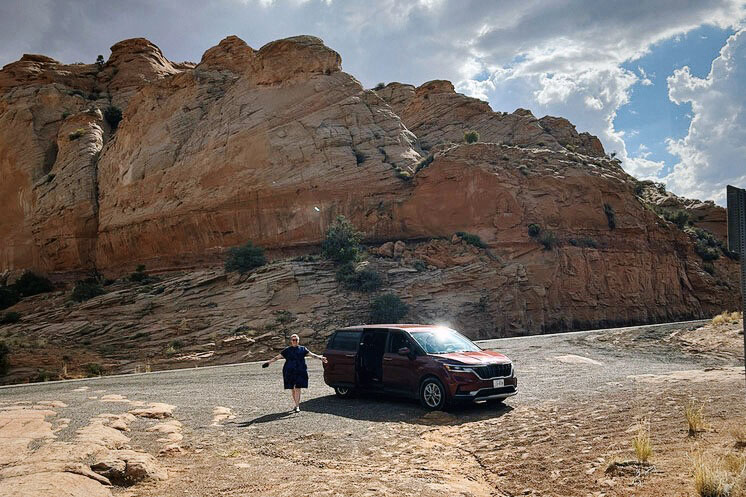
So it sounds like right now, if this is a battle between librarians and an assault on knowledge, you have some hope that the librarians are starting to win some of these battles?
It’s a mixed bag — these are hyper-local fights. As that’s happening in Missouri, Alabama continues to be on fire with individual libraries really struggling. But I do have some hope, and that is both because, talking with librarians in Missouri, it sounds like they had a better legislative season. But also because everywhere I went, libraries were packed to the gills with people doing programming that was relevant and interesting and engaging. The most durable support for any library is if it’s used a lot and used well. So, every time I saw that, I was like: This library is protecting itself. It is doing what libraries do, it is serving the entire community. The entire community loves it — and that means that the community will protect it.
